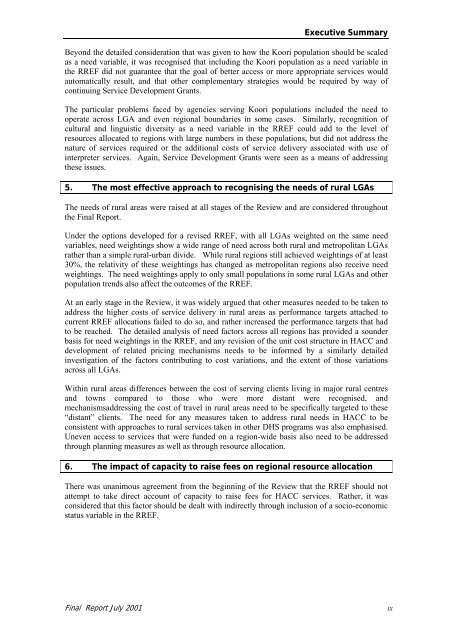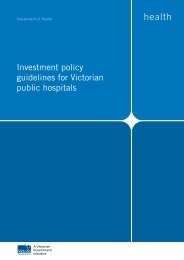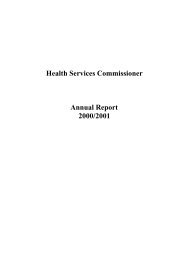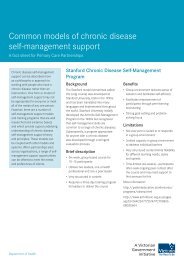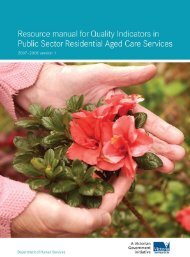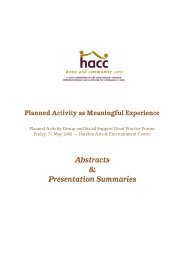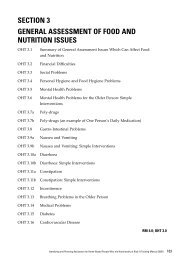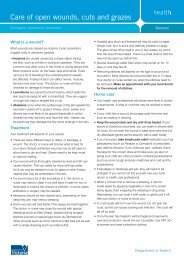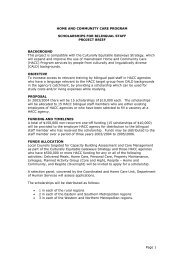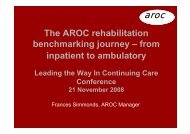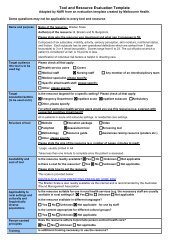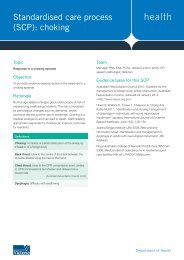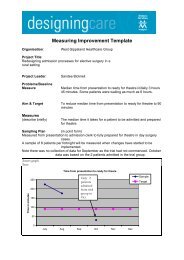Final Report on RREF 2001 - Department of Health
Final Report on RREF 2001 - Department of Health
Final Report on RREF 2001 - Department of Health
You also want an ePaper? Increase the reach of your titles
YUMPU automatically turns print PDFs into web optimized ePapers that Google loves.
Executive Summary<br />
Bey<strong>on</strong>d the detailed c<strong>on</strong>siderati<strong>on</strong> that was given to how the Koori populati<strong>on</strong> should be scaled<br />
as a need variable, it was recognised that including the Koori populati<strong>on</strong> as a need variable in<br />
the <strong>RREF</strong> did not guarantee that the goal <strong>of</strong> better access or more appropriate services would<br />
automatically result, and that other complementary strategies would be required by way <strong>of</strong><br />
c<strong>on</strong>tinuing Service Development Grants.<br />
The particular problems faced by agencies serving Koori populati<strong>on</strong>s included the need to<br />
operate across LGA and even regi<strong>on</strong>al boundaries in some cases. Similarly, recogniti<strong>on</strong> <strong>of</strong><br />
cultural and linguistic diversity as a need variable in the <strong>RREF</strong> could add to the level <strong>of</strong><br />
resources allocated to regi<strong>on</strong>s with large numbers in these populati<strong>on</strong>s, but did not address the<br />
nature <strong>of</strong> services required or the additi<strong>on</strong>al costs <strong>of</strong> service delivery associated with use <strong>of</strong><br />
interpreter services. Again, Service Development Grants were seen as a means <strong>of</strong> addressing<br />
these issues.<br />
5. The most effective approach to recognising the needs <strong>of</strong> rural LGAs<br />
The needs <strong>of</strong> rural areas were raised at all stages <strong>of</strong> the Review and are c<strong>on</strong>sidered throughout<br />
the <str<strong>on</strong>g>Final</str<strong>on</strong>g> <str<strong>on</strong>g>Report</str<strong>on</strong>g>.<br />
Under the opti<strong>on</strong>s developed for a revised <strong>RREF</strong>, with all LGAs weighted <strong>on</strong> the same need<br />
variables, need weightings show a wide range <strong>of</strong> need across both rural and metropolitan LGAs<br />
rather than a simple rural-urban divide. While rural regi<strong>on</strong>s still achieved weightings <strong>of</strong> at least<br />
30%, the relativity <strong>of</strong> these weightings has changed as metropolitan regi<strong>on</strong>s also receive need<br />
weightings. The need weightings apply to <strong>on</strong>ly small populati<strong>on</strong>s in some rural LGAs and other<br />
populati<strong>on</strong> trends also affect the outcomes <strong>of</strong> the <strong>RREF</strong>.<br />
At an early stage in the Review, it was widely argued that other measures needed to be taken to<br />
address the higher costs <strong>of</strong> service delivery in rural areas as performance targets attached to<br />
current <strong>RREF</strong> allocati<strong>on</strong>s failed to do so, and rather increased the performance targets that had<br />
to be reached. The detailed analysis <strong>of</strong> need factors across all regi<strong>on</strong>s has provided a sounder<br />
basis for need weightings in the <strong>RREF</strong>, and any revisi<strong>on</strong> <strong>of</strong> the unit cost structure in HACC and<br />
development <strong>of</strong> related pricing mechanisms needs to be informed by a similarly detailed<br />
investigati<strong>on</strong> <strong>of</strong> the factors c<strong>on</strong>tributing to cost variati<strong>on</strong>s, and the extent <strong>of</strong> those variati<strong>on</strong>s<br />
across all LGAs.<br />
Within rural areas differences between the cost <strong>of</strong> serving clients living in major rural centres<br />
and towns compared to those who were more distant were recognised, and<br />
mechanismsaddressing the cost <strong>of</strong> travel in rural areas need to be specifically targeted to these<br />
“distant” clients. The need for any measures taken to address rural needs in HACC to be<br />
c<strong>on</strong>sistent with approaches to rural services taken in other DHS programs was also emphasised.<br />
Uneven access to services that were funded <strong>on</strong> a regi<strong>on</strong>-wide basis also need to be addressed<br />
through planning measures as well as through resource allocati<strong>on</strong>.<br />
6. The impact <strong>of</strong> capacity to raise fees <strong>on</strong> regi<strong>on</strong>al resource allocati<strong>on</strong><br />
There was unanimous agreement from the beginning <strong>of</strong> the Review that the <strong>RREF</strong> should not<br />
attempt to take direct account <strong>of</strong> capacity to raise fees for HACC services. Rather, it was<br />
c<strong>on</strong>sidered that this factor should be dealt with indirectly through inclusi<strong>on</strong> <strong>of</strong> a socio-ec<strong>on</strong>omic<br />
status variable in the <strong>RREF</strong>.<br />
<str<strong>on</strong>g>Final</str<strong>on</strong>g> <str<strong>on</strong>g>Report</str<strong>on</strong>g> July <strong>2001</strong><br />
ix


